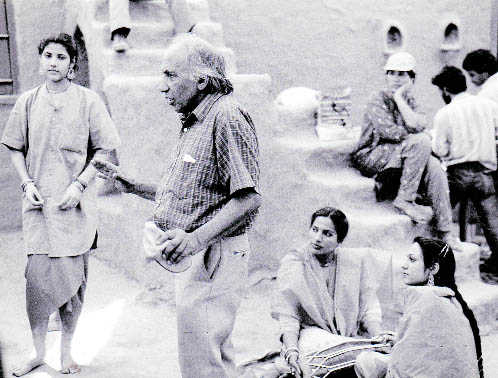He was as controversial as the characters he created, recalls a publisher. The way he woke up, the way he started his day, the way he held his pen, the way he talked, the way he fell in love and the way he separated… Balwant Gargi’s each act resembled an act of drama. His were days when acting was associated with lower caste people in feudal Punjab. It was late 1960s and the short-statured man whose birth centenary year the small world of literature will be celebrating had just come to Panjab University after teaching theatre at University of Washington. Students poked fun at him. Some said it seemed as if he had suddenly stopped while growing, others said if felt he had slipped into his elder brother’s trousers!
But the man was unaffected. He had an idea: Acting is a serious business and needs serious education. He asked youngsters to make a career out of it. “One who would reach the level of university and be interested in theatre education? No way,” says Gurcharan Chani, recalling those days.
Gargi was assigned to start Department of Indian Theatre at Panjab University with nothing but an open air theatre, a couple of wooden benches procured from Bijwara market, the only stuff in the name of resources in 1972. “But the then vice chancellor Suraj Bhan knew the man. He would arrange everything, somehow,” recalls Gurcharan Chani, Gargi’s student from the first batch and undisputedly Gargi’s favourite student. Chani also stayed with him for years at 27, Curzon Road, Delhi.
Classes began and, within no time, extended from the department to his house — from food to tea, all coming for the students from there. Life became a classroom, the classroom a part of life. Students hopped on to his car and accompanied him to Delhi to watch performances. The who’s who of theatre started visiting the university.
In her 2010 memoir Close-UP, veteran actress Zohra Sehgal recalls how during a Unesco Folk Theatre Workshop, she spent a month in February-March 1976 with Gargi at Panjab University and “found him to be an extremely flexible director, open to new ideas...” “We were proud of the fact that our teacher knew people like Bertolt Brecht personally,” says Chani. “Drama” started shaping up as a serious business. Biographer and novelist Uma Vasudev, whom he once offered a lead role in his play after seeing her walking on the road, said Gargi was “responsible for creating the professional feel for theatre in Punjab.”
Agrees Rani Balbir Kaur, another of his students from the first batch: “There was no theatre in Punjab before him and it has not been the same after him.”
Those years in Chandigarh, Chani recalls, were full of action and Gargi was at the centre-stage. He and his stunningly beautiful wife were a part of city’s elite circle. It became a talk of the town when Jennie left him for the US for her lover, says Chani. Soon, Gargi was to face another blow when he was refused extension by the university. The wife had left along with their daughter. Another of Gargi’s relationship didn’t work. He left for Delhi.
Life at 27, Curzon Road, Delhi, came alive. Satish and Inder Kumar Gujaral, Amrita Pritam, Uma Vasudev, Khushwant Singh, singer Surinder Kaur, writer Ajit Cour, poet Haribhjan Singh, publisher Bhapa Pritam Singh, poet Prof Mohan Singh were regulars. But life of the man, who died in 2003 after battling bouts of dementia and a brain stroke was no less dramatic. “From morning, to night, his life bore a dramatic signature. There was style in everything. It seemed he was part of a productions and life was a stage,” recalls Harish Jain, his publisher, who spent some time with him in Chandigarh in the late 1990s.
Recalls Paresh Gargi, his nephew who took care of him in his last days: “He lived life to the fullest — a life of no regrets.” Says Gurbachan Bhullar, a Delhi-based Punjabi writer, who spent a lot of time with Gargi in Delhi: “It is not possible to portray a man in black and white. His contribution to Punjabi literature is matchless.”
English & Punjabi
Balwant Gargi was born in village Sehna in Barnala district and was brought up in Bathinda and studied at Lahore. Gargi initially started writing in English. It was Rabindranath Tagore who asked him not to write in an alien language. After that, Gargi came out with the famous play ‘Loha Kutt’, followed by several other plays and short stories. Apart from theatre, playwright Gargi was known for his controversial pen sketches of Punjabi writer and artistes. “In Punjabi writing, many tried to write pen portraits, but could not as successfully. Those benchmarks are yet to be met in Punjabi. Those profiles were like painting portraits,” says Gurbachan Bhullar.
PU plans centenary
With release of an annual calendar bearing Gargi’s sketch, Panjab University has announced 2016 as Gargi centenary. A committee has been instituted to look after the centenary celebrations. These would include seminars, lectures and workshops.
His students
Couple Anupam and Kirron Kher, Neelam Mansingh, Satish Kaushik and Poonam Dhillon.
Unlock Exclusive Insights with The Tribune Premium
Take your experience further with Premium access.
Thought-provoking Opinions, Expert Analysis, In-depth Insights and other Member Only Benefits
Already a Member? Sign In Now










